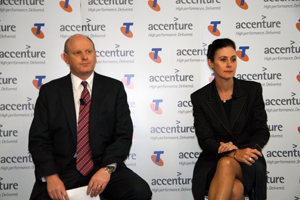Telstra, Accenture: cloud dynamic duo

Telstra has inked a three-year partnership deal with Accenture that will see the two technology giants work together to deliver cloud computing services to large Australian organisations, dividing up responsibilities according to their respective competencies.

Accenture's Steve Willis and Telstra's Nerida Caesar (Credit: Josh Taylor/ZDNet Australia)
As part of the deal, Telstra will focus on managing the underlying infrastructure associated with the new generation of computing services, while Accenture will focus on the applications side.
Telstra group managing director of Enterprise & Government, Nerida Caesar, said the pair had enjoyed a long existing relationship; Accenture has worked with Telstra for several years to help deliver its new billing platform.
"We've been in discussion for some time building up the framework," the executive told journalists in Sydney today. "It's been a really smooth process."
The three-year agreement was signed in April and the companies have so far secured five customers for the services including civil contractor Fulton Hogan as well as Stella Travel Services. They are also in discussions with another 30 clients.
Accenture Australia's managing director of its Communications & High Tech division, Steve Willis, said the company was "really excited" about the link, as it rarely partnered as deeply with organisations.
The partnership made sense from an Accenture perspective, he noted, partly because the IT services giant was a "capital-light" company in the sense that it didn't focus on building its own datacentres and associated infrastructure as Telstra did. It was "very hard to see any overlap" between the services that Accenture and Telstra offered, he said.
There had in the past been some overlap between Accenture and Telstra in that the telco had once owned Kaz, an IT services business. But following the sale of that business to Fujitsu last year, Telstra chief executive David Thodey said that Telstra was not in the business of providing "IT services".
Willis said that the partnership had several advantages over rivals in the cloud services market such as Fujitsu and CSC.
Telstra's Next IP network and onshore datacentre facilities combined with Accenture's experience would allow the pair to get ahead. "The combination of Telstra and Accenture can offer things which I don't think anyone else in the market can offer at this point," he said.
Telstra competitor Optus has built its own cloud computing platform based on the technology alliance which has been wrought between VMware, Cisco and EMC known in the market as VCE. Westpac is also using the platform for its own internal private cloud. Some outsourcers, such as CSC, have already committed to providing cloud services with Microsoft's stack, and are signing up customers for cloud-based email services, for example.
But both Telstra and Accenture executives refused to be drawn on what technology they were using to underpin the services or what sorts of applications Accenture would provide on top.
Willis said that Accenture was initially talking to clients about what applications they had and how they could be migrated into the cloud. Both Telstra and Accenture had their own applications development programs, he said, and so the pair were working on how they could be brought together.
"We're going into each client environment to really understand that environment, their triggers to make a move," said Caesar. "They each have a different reason as to why they're heading down this path." One example might be the need to make an infrastructure upgrade. "That's a real reason to have a conversation," said Caesar.
Both executives agreed large organisations were looking to shift spending away from capital expenditure and towards operational expenditure that would allow them to be more flexible in how they used resources.
Caesar said the company would not make pricing for the services public, stating it was part of the discussion the companies would have with their customers. Willis said that price of the service wasn't a "driver" for the discussions.
Josh Taylor contributed to this article.